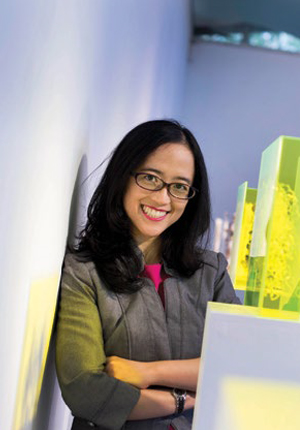Raising the Bar
Sometimes all you need to explain the universe is a handful of marshmallows.
This revelation emerged during an innovative class assignment at the Massachusetts Institute of Technology (MIT), where Yoda Rante Patta was honing her teaching skills. In 2011, she asked students enrolled in a course called Microstructural Evolution in Materials to use colored marshmallows to make dioramas illustrating how atoms relate to each other. The students approached the task with relish, molding some very sticky electrons in the process.
Now Yoda’s task is to mold a fresh cohort of scientists and engineers emerging from Sampoerna University, a new private institution accredited in 2013 in Jakarta. At the surprisingly young age of 32, she was appointed dean of the Faculty of Engineering and Technology. And after just two years on the job, her dedication to expansive modes of learning has come to be widely admired. Without question, her experience at MIT—supported by a Fulbright Visiting Student scholarship—has been essential to shaping her ideas of academic achievement, and recruiting other faculty to the cause.
No one can cross the threshold of the dean’s office without seeing the “Pledge of Academic Integrity” placed high on a glass panel. “Private universities can have a huge impact on meeting unmet needs. But it needs to be done right, with integrity and high academic standards,” 34-year-old Yoda maintains. “The students are not customers. They are here to gain knowledge and skills.”
Those essential skills include fluency in English. That’s the medium of instruction in all courses at Sampoerna, where an engineering degree leads to a diploma endorsed by Louisiana State University in the United States. (Most Indonesian universities rely on the national language, Indonesian, as the medium of instruction.) Yoda must straddle two worlds, as she strives to fulfill the requirements of Indonesia’s Ministry of Research, Technology, and Higher Education while negotiating with her counterparts in Louisiana. This makes her an academic pioneer, in a world where Indonesian youth must scramble to get up to speed with international standards.
Yoda values her hybrid existence. “I feel I’m always a little bit foreign wherever I am. I learn to embrace it,” she says.
Indonesian colleagues appreciate Yoda’s penchant for forthright communication, as they often feel stymied by the indirect dialogue long accepted as a cultural norm. “She has a strong voice and makes strong arguments for our curriculum,” observes Soepriyatna, vice rector for academic and student affairs at Sampoerna University. In some meetings, he has relied on Yoda to articulate his own disagreements on various issues. “It works!” says Soepriyatna, with a snap of his fingers.
Today Yoda speaks perfect English, but that was not always the case. Born in Bandung, she was whisked off to the United States as a four-year-old child, while her father worked on a master’s degree in urban studies. She returned to Indonesia for primary school, mostly forgetting whatever English she had soaked up earlier. When her family decided to move back to the United States, Yoda landed in the 8th grade in Somerset County, New Jersey, with hardly any English at her disposal.
She felt a fierce ambition to prove herself. Before long, she catapulted from ESL (English as a Second Language) classes, to poring over encyclopedias, to writing a sophisticated paper on antimatter for a chemistry class. Having skipped a couple of grades, she entered Rutgers University in New Jersey at the dewy age of 16. Again, she excelled. Stephen Danforth, then chairman of Rutgers’s Department of Ceramic and Materials Engineering, called her “the best undergraduate student I have seen in the past 26 years,” in a recommendation letter.
And although Yoda was compelled to work three part-time jobs to help finance her education, she still found time to organize myriad trips, cultural shows, and orientation sessions as president of the International Students Association. “She has the energy and enthusiasm of ten students,” noted Marcy Cohen, then the director for the Center for International Faculty and Student Services at Rutgers.
She had just one more year to go at Rutgers, well on her way to graduating with distinction, when, suddenly, she changed course. It hit her that she missed Indonesia. She didn’t want to sacrifice the deep friendships that could be forged during college years in her native environment. So she started all over again, at age 19, at the Bandung Institute of Technology. Working on nanostructures, she felt the excitement that comes from a successful lab experiment. “The best part was just to feel Indonesian again, and feel like I belonged,” Yoda recalls.
Graduate studies took her back to the United States in 2005, thanks to a Fulbright grant. At MIT, she found not only a bunch of equally driven nerds, but individuals who wanted to improve the world in some way. Under the aegis of MIT’s Technology and Culture Forum, Yoda sought to raise awareness about violence against women and later integrated that interest with lab work on reducing scar formation in women who had been attacked. In addition to a master’s thesis related to superconductors, she raised funds for the international aid group Doctors Without Borders. For her degree in materials science and engineering, she changed directions again, throwing herself into efforts to devise a biomedical device for brain cancer patients. Yoda describes MIT as “a place that encourages critical questioning, and allowed me to find myself.” But she always planned to return to Indonesia, where she thought she could have the maximum impact.
She found most consistent satisfaction in teaching—first as a teaching assistant, then as a lecturer. During classroom sessions and one-on-one tutoring, she became aware of many different approaches to learning, including those that appealed to minds more artistic than mathematically oriented. Marshmallows were just the beginning. In Jakarta, and in recent lectures in Australia, Yoda has become a champion of integrating the arts into STEM (science, technology, engineering, and mathematics) studies, expanding the acronym to STEAM. She still teaches up to two classes each academic semester.
Not surprisingly, she has also backed efforts to encourage more young women to earn engineering degrees—and use them. Yoda notes the problem of many women unable to put their diplomas to work, due to the strictures of academia. During Open House days at Sampoerna, she makes sure that plenty of young women serve as student ambassadors at the engineering and technology booth, and Yoda herself enjoys mingling with the wide-eyed high schoolers who drop in with questions.
She does have some experience with men who don’t take her seriously. On occasion, Yoda’s petite frame (barely exceeding five feet) and friendly demeanor belie the gravitas of her position. One witless job applicant prattled on, ultimately asking, “When will I get to meet the dean?” (He didn’t get the job, Yoda recalls with a chuckle.)
Women comprise about 30 percent of Sampoerna’s engineering and technology faculty, which may sound good compared to faculty statistics in other countries, but not sufficient in Yoda’s eyes. She tries to encourage women staffers to believe in their potential. Shinta Dewi, a graduate of the University of Gadjah Mada (UGM), says she is grateful to have Yoda as a role model. Now working as a science lab coordinator at Sampoerna, she is striving to improve her English. Yoda has encouraged her to “surpass her limits,” and explore the possibility of graduate school overseas. “I am rather introverted and sometimes lack confidence,” 26-year-old Shinta admits. “Dr. Yoda always challenges me.”
Yoda’s blue-chip MIT pedigree has also been a magnet for faculty hires. Ammar Aamer, a native of Yemen, capped his academic training in the United States with a PhD in industrial engineering at the University of Tennessee. Instead of remaining in America, or heading back to a country engulfed by civil war, he opted to relocate his family to Jakarta and join Sampoerna. “Knowing that she was a graduate of MIT, that was one of the triggers for me to work here,” he says. “She was very welcoming, and very comforting.” Soepriyatna adds, “People will rely on her judgment because she graduated from MIT.”
Actually, Yoda herself landed at Sampoerna after a detour into the corporate sector. Following a year of postdoctoral research at Stanford University, she accepted a consulting job in Jakarta with the Boston Consulting Group (BCG). It wasn’t a good fit. Luckily, a BCG partner introduced her to the Sampoerna team. And, when it came to devise a new method for financial projections, Yoda found that the corporate job had given her the right tools to guide her academic colleagues in creating their spreadsheets to meet the deadline.
Attempts to provide American-style education on Indonesian shores entail long hours and some frenzied multitasking. It’s all a learning process. For Yoda, however, a sudden look of comprehension on a student’s face can be the sweetest reward of all.
Last Updated: Apr 15, 2019 @ 2:43 pm




